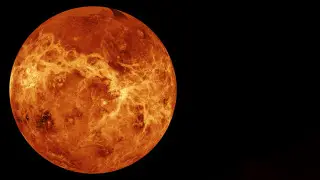Tengrinews.kz - For years, scientists have observed intriguing "patterns" on Venus known as tesserae, unique features found nowhere else. The term "tessera" comes from Greek, meaning "square mosaic" or "tile." These surface features resemble tile, parquet, or relief carvings. Planetologists have identified about 60 Venusian tesserae, each named after a goddess. Recently, one of particular interest, named after the Navajo deity Haasttse-baad, caught their attention, according to Naked Science.
This tessera spans roughly 2,600 kilometers and displays circular contours with concentric rings about 1,500 kilometers in diameter.
Interestingly, among the hundreds of impact craters on Venus, none are of this size, and craters larger than 300 kilometers are rare. Nevertheless, a team of Spanish and American planetologists suggested that this feature could indeed be an impact formation, though an exceptionally unusual one.
"In their article for Journal of Geophysical Research: Planets, they explained that they compared the mysterious rings on similar structures on other planets and moons in the Solar System. As a result, one structure, in particular, caught their attention: the vast Valhalla Basin on Jupiter’s moon Callisto. It, too, is outlined by concentric rings, the widest reaching a diameter of 1,900 kilometers. And this is indeed an impact structure," the article states.
What is remarkable is that the asteroid that impacted here didn’t hit solid ground but ice. This is evident from the way the structure appears white against the surrounding dark background. Planetologists are confident that Callisto, like Europa (another moon of Jupiter), Enceladus (a moon of Saturn), and perhaps even Uranus's moon Miranda, is also covered by a thick ice shell.
Whether there are currently any water reservoirs beneath Callisto's ice is a complex question. However, at least in the past, there may have been an entire subsurface ocean. In any case, these rings were formed by water that surged up from beneath the solid crust pierced by the asteroid.
"This led planetary scientists to an interesting idea: they suggest that the remarkable rings on Venus formed in a similar way, but instead of water spreading on the surface, it was molten magma. Since this structure is very ancient, scientists propose that, at the time of its formation, the planet was still covered by a very thin layer of solid crust. Breaking through it would not have been difficult, especially with such a massive asteroid," the article explains.
Another intriguing detail is that some of the circles are offset in a way that suggests they may be traces left by not one, but two asteroids. According to rough estimates, each of them would have had a diameter of about 75 kilometers.
Previously, NASA launched a spacecraft aimed at studying whether Jupiter's moon, Europa, could have conditions suitable for supporting life. More details in the article.

